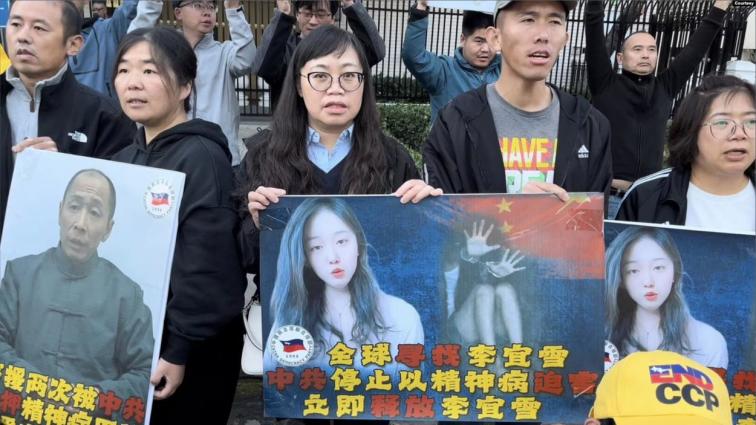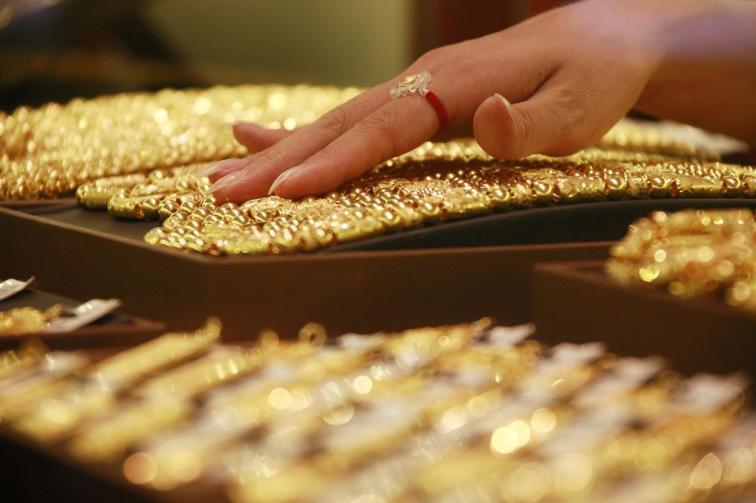Does anyone know if there truly exists a little spirit or a divine messenger in the world who constantly observes people’s words and actions, reporting regularly to the heavens, and dispensing corresponding rewards or retributions based on each person’s good or evil deeds? (Fotolia)
[People News] As Christmas approaches, the situation in China this year seems to differ from recent years. Previously, the Chinese Communist Party (CCP) and some segments of the public had actively resisted celebrating "Western holidays" like Christmas, with local governments even banning festive decorations in certain areas. However, in the current economic downturn, the government appears less averse to such celebrations.
According to a report by Radio Free Asia, December 25 marks Christmas Day. Many citizens had anticipated another wave of anti-Christmas propaganda, but feedback from social media and local residents suggests otherwise.
A YouTube content creator based in Japan, known as "Wu Yue San Ren," remarked in a recent video: "Over the past couple of days, several friends and netizens from China told me that this year’s Christmas atmosphere is picking up again."
A Shanghai resident, Mr. Sun, noted: "This year’s festive atmosphere is the liveliest it’s been in recent years. Places like Xintiandi have many Christmas decorations, and we even made a special trip to see them. Public accounts are also sharing posts about the best Christmas trees, decorations, or Christmas markets."
A search of Chinese websites revealed promotional campaigns such as "Celebrate Christmas and New Year Together" on Sina.com, holiday-themed shopping discounts, and even a WeChat feature offering "ceremonial blue envelopes" for those who forgot to prepare Christmas gifts. Advertising agencies have launched "2024 Christmas & Christmas Eve Theme Selection Campaigns," and even the state-run China Daily published a cartoon featuring Santa Claus on December 23.
A Guangzhou resident, Mr. Wu, told the reporter: "In the past, anti-Western holiday messages were everywhere during this time of year, but this year, no one seems to care about Christmas anymore. The internet is full of Christmas-related content."
He speculated that this change reflects the government’s lack of guidance or directives on the issue, leaving online propagandists and nationalists disinterested.
YouTuber "Lao Fan," who recently returned to China, shared a similar observation: "Is the government encouraging Christmas celebrations this year? Not exactly. They’re just not promoting the idea of boycotting ‘Western holidays’ as they used to."
Why Has the CCP Stopped Opposing Western Holidays?
In past years, the muted Christmas atmosphere in China stemmed from official crackdowns and nationalist-driven boycotts. This year, however, the government has refrained from overt opposition.
A netizen bluntly commented: "When the economy tanks, national confidence takes a hit. It makes sense—financial stability comes before spiritual pride. If people are struggling to eat, what’s there to feel confident about?"
Mr. Sun in Shanghai offered another perspective: "The government likely wants to avoid giving the impression of a closed-off, isolated nation. They don’t want foreign investors leaving too quickly."
Amid a prolonged economic slowdown, the CCP has been actively courting foreign investment. In mid-November, the Ministry of Commerce held a roundtable on implementing its "24 Measures for Foreign Investment." Later that month, Premier Li Qiang met with global business leaders attending the Second China International Supply Chain Expo. In December, Xi Jinping emphasized expanding high-level openness and stabilizing foreign trade and investment during the Central Economic Work Conference. Recently, the CCP extended visa-free transit for citizens of 54 countries from 72/144 hours to 240 hours, allowing inter-provincial travel.
Despite these efforts, data shows foreign capital is leaving China at an alarming rate. In November, China saw a net outflow of $45.7 billion in cross-border securities investments, the highest monthly figure on record. Meanwhile, foreign direct investment (FDI) in China is on track to record its first net outflow. Experts predict this pessimism regarding China’s economy may persist into the first quarter of next year.
According to official statistics, China’s total retail sales of consumer goods reached 4.38 trillion yuan in November 2024, up only 3% year-over-year. This marks a sharp 37.5% decline from October’s growth rate of 4.8% and falls short of the 4.6% market forecast. Consumption in Beijing and Shanghai also plummeted, with retail sales in November down 14.1% and 13.5% year-over-year, respectively.
Mr. Sun noted the economic downturn’s impact in Shanghai: "A ride-hailing driver told me two things: fewer people are dining out, and more people are signing up to be drivers." He also observed that luxury supermarkets, like CityShop, are shutting down as people curb spending.
In Shenzhen, Mr. Jiang explained that Christmas promotions are purely commercial: "Frankly, it’s all about boosting sales. Merchants will use any holiday to sell more products—it doesn’t matter what the holiday is."
In Yanjiao, Hebei, near Beijing, dissident Ji Feng said: "Nobody cares about celebrating Christmas anymore. Hotels and restaurants on the streets are closing down, and few people are visiting. Bars and private rooms are empty too."
Where Is China’s "Cultural Confidence"?
For years, the CCP and its "leftist" supporters have resisted Christmas celebrations. In 2006, 10 philosophy and education Ph.D. holders from prestigious institutions like Peking University and Tsinghua University co-authored an article titled "Awaken the People and Resist Western Cultural Expansion," calling on netizens to approach Christmas cautiously and criticizing merchants’ use of Christmas for marketing.
Since Xi Jinping came to power, the authorities have emphasized "cultural confidence," and official actions against Christmas have become increasingly common. In December 2017, Hengyang, Hunan Province, issued a stern notice prohibiting Party members, officials, and their families from blindly celebrating "Western holidays" or participating in religious activities with Western ties. By 2018, several Chinese universities, middle and primary schools explicitly banned students from celebrating or even discussing Christmas on social media. Local governments in provinces such as Hebei, Guizhou, and Guangxi also issued bans prohibiting businesses from displaying Christmas decorations. That same year, the CCP revised its Regulations on Religious Affairs, intensifying its crackdown on house churches.
In December 2023, this platform reported that schools and kindergartens in Guangdong, Fujian, and Heilongjiang instructed students and parents to avoid Christmas Eve and Christmas celebrations. In some areas, authorities even banned house church gatherings to celebrate Christmas. Netizens also cited comments by Chinese Foreign Ministry spokesperson Mao Ning, who reportedly stated that China does not recognize Christmas Eve but instead commemorates the 73rd anniversary of the victory in the Battle of Chosin Reservoir on December 24.
This defensive stance against Christmas seems inconsistent with Beijing’s claims of "cultural confidence" and contrasts sharply with the United States’ embrace of Lunar New Year. Over the past decade, every U.S. president—Obama, Trump, and Biden—has publicly extended Lunar New Year greetings. The White House has even decorated its halls with red lanterns and celebrated the holiday with Asian American and Pacific Islander staff.
Addressing this phenomenon, Tang Jingyuan, a U.S.-based political commentator, said: "This reflects genuine confidence—a tolerance for different cultures." Tang noted that traditional Chinese culture also has an inclusive nature, while the CCP’s "cultural confidence" rhetoric disguises its efforts to destroy Chinese culture. "What the CCP calls 'cultural confidence' is merely a pretext to resist universal values like human rights. In essence, their so-called confidence is about defending their authoritarian, distorted, and red ideological values."
Due to safety concerns, interviewees referred to as Sun, Wu, and Jiang in this article have used pseudonyms.
U.S. Congressman: CCP "Deprives Citizens of Christmas Joy"
While the commercial atmosphere of Christmas celebrations in China is growing, reports of police harassment of house church Christians during Christmas gatherings continue to surface. According to a widely circulated video and a report by the U.S.-based religious organization ChinaAid, on December 19, Xiao Luobiao, a deacon of Chengdu’s Early Rain Covenant Church, was summoned by police from the Yongquan Police Station of Wenjiang District. His "offense" was hosting a meal and Christmas celebration at his home under the name of a disbanded social organization.
In the video, two police officers visit Xiao’s home, with one officer saying: "You invited people to gather at 4 p.m., eat at 5:30 p.m., and finish at 9 p.m. We have records of everything."
Xiao responded: "Oh, so you’re saying I can’t invite a few people to my home for dinner?"
The officer countered: "No, this is an organized event, okay? It’s an activity." The police warned Xiao not to hold Christmas celebrations, threatening criminal detention if he did. The officer even said, "You can post this video online." Xiao was taken away and released later that afternoon.
On December 23, U.S. Congressman John Moolenaar, Chair of the House Select Committee on the Chinese Communist Party, issued a statement on Christmas and religious freedom in China: "This week, as Americans celebrate Christmas, I pray for a day when the Chinese people can enjoy religious freedom." He added: "The Chinese Communist Party deprives its citizens of the joy of Christmas, forcing believers to worship secretly or comply with the state, while indefinitely detaining many religious adherents."
Moolenaar praised those who courageously uphold their faith despite persecution, calling them an inspiration for all who oppose the CCP’s brutal repression: "As Americans, we are fortunate to live in a country that values religious freedom. In our competition with the CCP, the freedoms of our nation will ultimately prevail."
The statement cited the U.S. Commission on International Religious Freedom, which reported that the CCP harasses "Christians, Tibetan Buddhists, Falun Gong practitioners, and other religious groups." Independent experts estimate that between 900,000 and 1.8 million Uyghurs, Kazakhs, Kyrgyz, and other Muslims are detained in more than 1,300 concentration camps in Xinjiang.











News magazine bootstrap themes!
I like this themes, fast loading and look profesional
Thank you Carlos!
You're welcome!
Please support me with give positive rating!
Yes Sure!